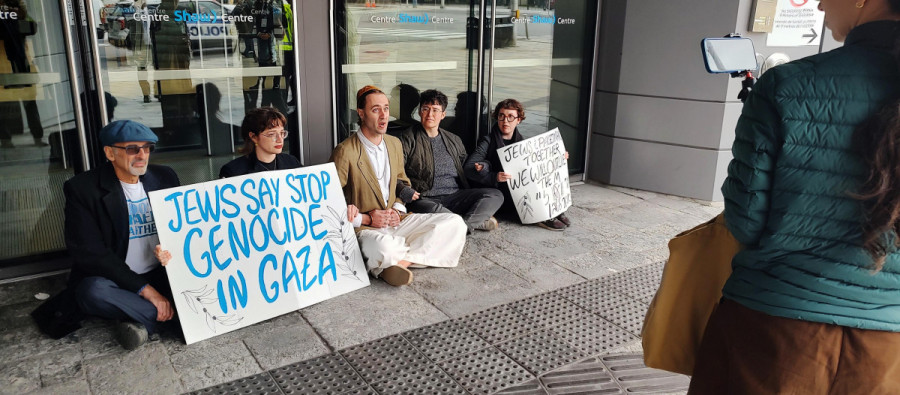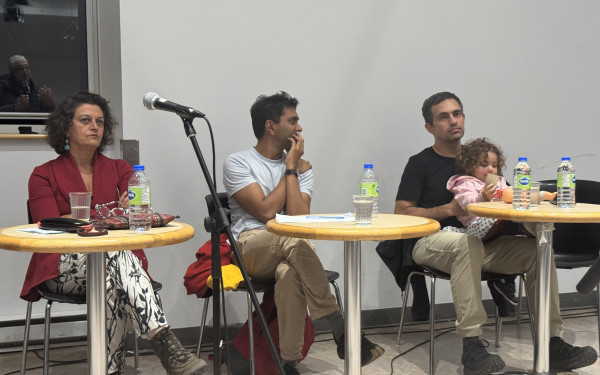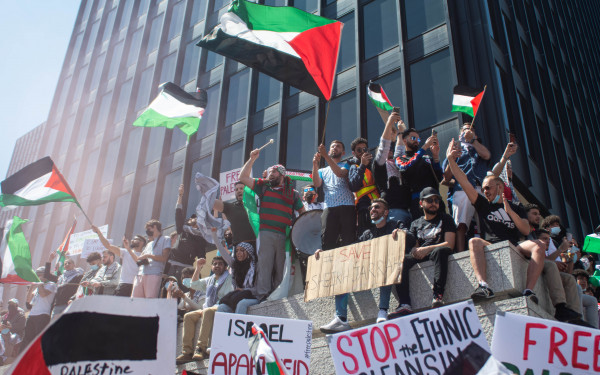The unspoken violence of censorship
Silencing Palestinian resistance is stifling democracy
The calamity in Israel and Gaza has been incredibly emotional and grief-stricken, particularly for those connected to the region. As a Jewish person, I am struggling to reconcile my community’s response to this past week’s events.
New atrocities unfold so quickly that it feels impossible to process the last hour of news. However, the dehumanization of Palestinians has added a layer of bitterness and confusion that has made grieving all the more turbulent.
On Oct. 7, Ben Mizrachi—who I went to a Jewish high school with in Vancouver—was murdered in the Hamas attack on the music festival near Gaza, where 260 Israelis were killed. He had stayed behind to perform first aid on a friend who had been shot. He was always incredibly thoughtful, generous and well-loved; his loss is felt deeply throughout the entire Vancouver Jewish community.
While processing Ben’s death, I waded through the flood of my community’s reactions on Instagram. One circulating post included the line, “Israel must do whatever it needs to defend itself,” when earlier that morning, the Israeli Defence Minister had promised to “turn Gaza into rubble.”
This promise has since been upheld with a total siege on Gaza, with Israel bombing schools, neighbourhoods and hospitals, as well as cutting off electricity and water across the strip. The Israeli and Egyptian border crossings have been closed throughout this week, making it incredibly difficult for Palestinians to escape.
A post from comedian Amy Schumer, who has recently dedicated her Instagram to pro-Israel infographics, was circulating on social media: “If your response is ‘Yes BUT…’ you need to take a step back and ask yourself why the indiscriminate killing of civilians is defensible to you in this one and only case.”
Both Zionists’ and pro-Palestinians’ positions have been hardened since the attacks. Schumer’s rhetoric paints a narrative that there is only one side. Of course civilian death should be condemned—but if you so much as acknowledge the other side, or question how we arrived at this bleak point in history, you risk being accused of perpetuating violence. It is much easier to rationalize the grief of war crimes if you invalidate your enemy.
This silencing is incredibly dangerous. Dehumanization and policing debate have played key roles in the perpetration of genocide throughout history. In the demonstrations this week, both by pro-Palestinian and pro-Israel advocates, people are looking for an outlet to express grief, pain and fear. Silencing or ignoring the other breeds hatred and this hatred is being used to justify the murdering of civilians.
Silencing or ignoring the other breeds hatred and this hatred is being used to justify the murdering of civilians.
Open and empathetic discussion is the necessary first step of all democratic processes. Many who hold strong opinions about Israel-Palestine might believe that entertaining the opposition is dangerous and puts you at risk of engaging in hate speech, but I believe silence on the matter is far more deadly. Moreover, the impossibility of democratic discussion around Israel-Palestine has been exacerbated by misinformation and online rumours.
Willa Holt of Independent Jewish Voices, a Jewish-led Palestine solidarity organization, said leading conversations with compassion is key. “The only way that you can get through to someone who’s experiencing such a deep level of trauma and such an instinctive fear response is to lead with the idea that multiple things can be true at the same time,” Holt said.
Too many people online jump to share flippant statements without creating space to mourn, and the hysteria is fitting; there is not enough time to process as murder and destruction continue to unfold in Gaza and Israel every day.
The silencing of Palestinians extends far beyond social media. This week, France has placed a ban on pro-Palestine demonstrations. An organizer for Palestinian Youth Movement in Montreal, who prefers to remain anonymous for this story, said this ban is “not very surprising.”
“People need to be aware of these double standards. When Russia invaded Ukraine, people were allowed to raise the Ukrainian flag with no problem. So why shouldn’t we be able to do the same?” they say. “If they haven’t addressed the recent increase of hate crimes, then there’s no reason to think that they wouldn’t push policies [like the anti-demonstration one].”
On Oct. 16 and 17, the Centre for Israel and Jewish Affairs (CIJA) is hosting a conference on parliament hill in Ottawa to fight antisemitism. Seven hundred people are expected to attend, including over 90 MPs and senators. This is possibly one of the largest advocacy days ever, for any issue, on parliament hill.
One of CIJA’s key policy requests at the conference is for Canada to officially recognize that anti-Zionism is a form of antisemitism. If this becomes enshrined in law, any criticism of Israel would be made illegal, and the likes of France’s move to outlaw any pro-Palestine demonstrations may soon be seen in Canada.
A law like this would be dangerous for several reasons. Eliminating space to criticize a government further stifles debate and is a step toward dictatorship. Outlawing criticism of the government is not tolerated in Western democracies—why should we encourage silence about a government in the Middle East?
Avoiding criticism of Israel’s occupation does not keep Israelis or Jewish people safe. The fear of antisemitic hate speech is incredibly present among Jewish people, which is something we have struggled against for millennia. However, conflating criticism of Israel with antisemitism waters down the very real threat of antisemitism, which has recently risen alongside white supremacy.
Eliminating the possibility of nonviolent self-expression further radicalizes opponents of the occupation if there is no longer space to debate freely and legally. Hearing out all viewpoints is the first step to democracy, which Israel is clearly very far from at the moment: the 2.8 million Palestinians living in the West Bank and Gaza strip are unable to participate in Israeli elections, even though their borders, security and thereby imports are controlled by Israel. The inability to hear out the other side with compassion is having real-life consequences, as it becomes easier to take down an unknown enemy.
The current ethnic cleansing that is underway after Israel declared a total siege of Gaza, as well as Hamas’ massacre that killed 1,300 Israelis since Oct. 7, is incredibly scary and painful for everyone with family and friends in Israel-Palestine.
In the words of Ben Mizrahi’s classmate, Rakeaa Chesick-Gordis, from a vigil held last week:
“When we react from a place of hurt, fear and sadness, we expect that it will alleviate pain. We think that placing blame, looking for explanations, trying to make any semblance of sense of the incomprehensibility of it all will make the suffering just a little bit less: But it doesn’t. Instead, it dizzies us, hardens the mind and the heart, creates false promises of relief that don’t actually address what’s going on. We are hurt, scared and sad.”
I hope my community can soften our hearts and find a collective pathway toward justice.
This article originally appeared in Volume 44, Issue 4, published October 17, 2023.







